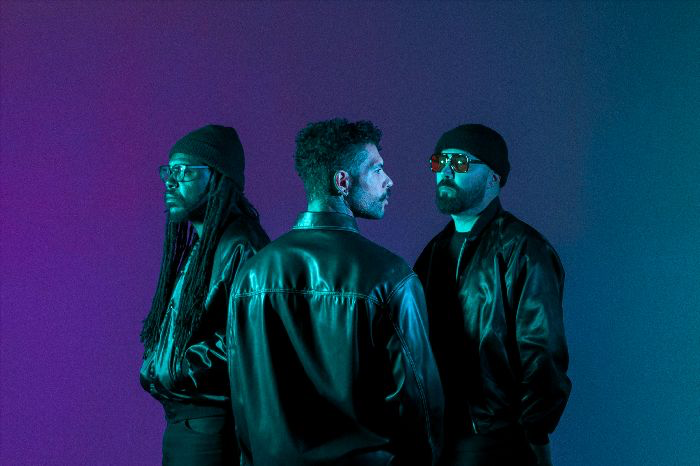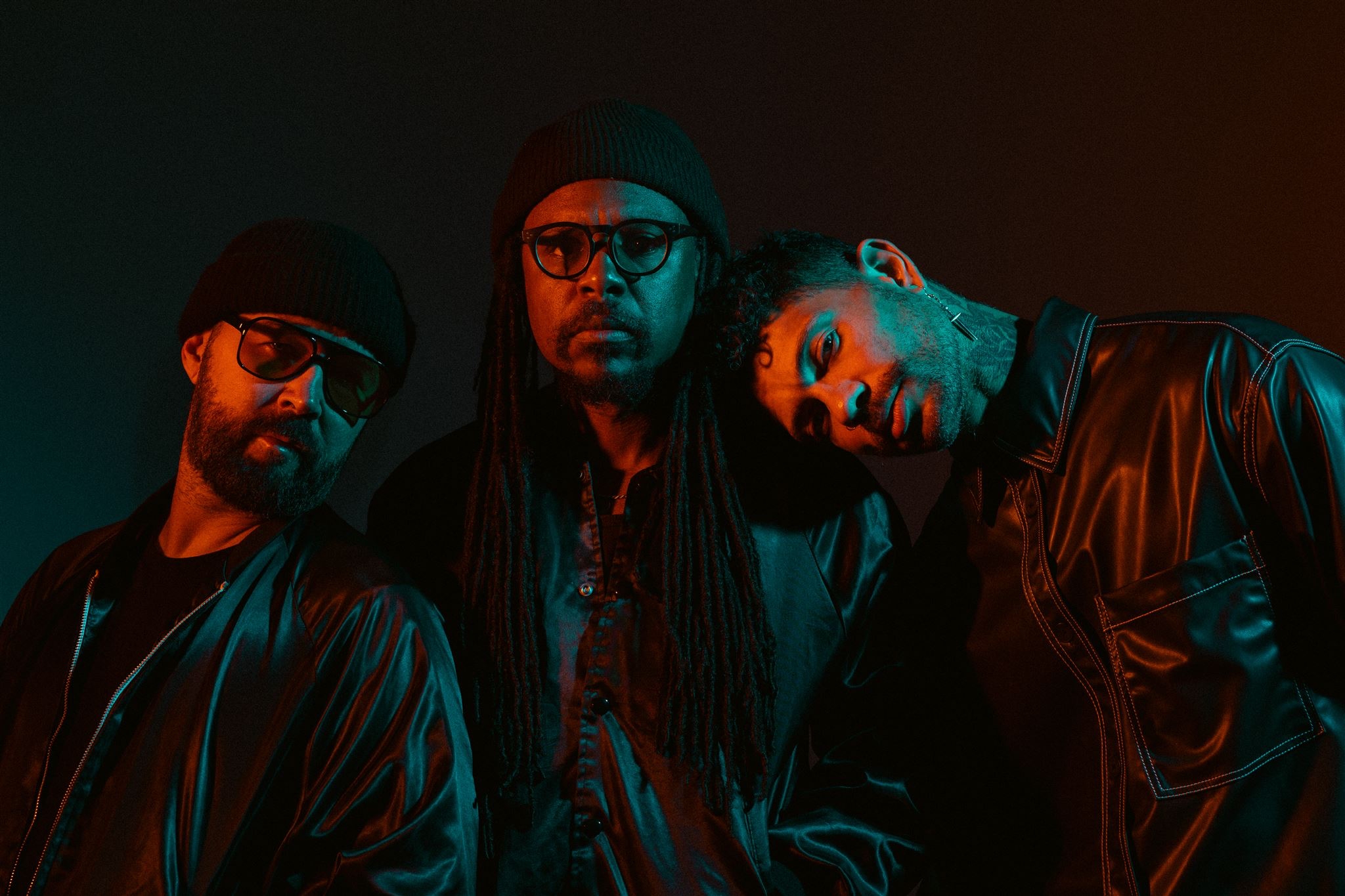Whilst growing up between Florida and California, Jonathan K. Horstmann, unfortunately, didn’t have much exposure to pop culture, due to his parents’ strict religious views, yet, he was permitted to play music, for which he took up violin and piano.
“Because my parents were very, very religious, it was, ‘Use your creativity to the glory of God,’ and everything had to be within that sort of framework,” Jonathan tells Post-Burnout of his childhood. “Which is difficult when you’re young and exploring creativity and exploring art because, especially as a child, creativity is just about no limits at all, you know, and exploring everything.
“So, that’s when I really started splitting off from my parents’ idea of religion, really, when it came to music because I was able to make sounds that I was told were wrong, and I was like, ‘Well, then why can I do this?’ [Laughs] You know what I mean? ‘I’m discovering things!’”
Once away from home, it wasn’t long before Jonathan would succumb to hedonistic submission. “I was fifteen, and a kid transferred into our school – I was at a private Christian academy – and this kid came in, who listened to Against All Authority and Total Chaos, and [he] just exposed me to this stuff that made no sense to me, mentally, but, for my heart and my body, it made perfect sense as an angsty teenager,” he says.
“I didn’t have a lot of friends in school and I didn’t have a sense of fashion, and then here came all these Dickies, and jumpsuits, and Doc Martens, and mohawks, and, like, there’s a uniform for outcasts like me!”
After discovering the joys of hardcore, Jonathan made some like-minded friends and they would meet up in one of their garages, get pizza, sing karaoke, mosh, and, in Jonathan’s words, “beat the shit out of each other!” “It was great because it kept us out of so much trouble,” Jonathan reflects. “There were so much worse things we could have been doing, and we were just in there.”
Soon Jonathan discovered Christian punk music and began attending Christian hardcore gigs. “I went to my youth pastor, and I was so psyched,” remembers Jonathan. “I was like, ‘Look, I discovered this thing! It’s so incredible, and all these kids are learning about God and Jesus!’, and he was just like, ‘No. That’s the Devil’s music. There’s no such thing as “Christian rock.” It’s either Christian or it’s rock,’ and I was done at that point.”
Jonathan credits observing the differences and contradictions of what was deemed permissible between believers of the same faith for helping him to start thinking more critically. “As you see that everyone, at the end of the day, is trying to do what feels right to them, what resonates to them, then you have to kind of look at it like, ‘OK. What resonates for me?’,” he says.

Courtesy of Reybee, Inc.
After leaving high school, Jonathan, uncertain about what he wanted from life, aimlessly travelled the country with touring bands. “There was definitely music,” he says of this time. “Music was a means to get all the things that were restricted to me in a strict household – so, girls, drugs, and alcohol – and music was a vehicle for me to do that. So, I just went as hard as I could.
“And, really, I didn’t think I was living mindlessly; I thought I was living a very artistic, creative life, and I was living my life itself as art, just kind of bucking against the system in any way that I could. I was an anarchist and lived in punk squats, and I just wanted no part of [Gestures around him] the rest of this.
“I saw it as completely hopeless and, therefore, myself. All of my idols, at that point, were all people who were part of the 27 Club, who had died young, and that was my plan, was just to make as much art as I could and burn out, fast.”
Looking back on that material now, Jonathan is less than enthusiastic about it. He says, “One thing, creatively, we always have to put stuff out, even if it’s shit because we’re practising. Like, we have to create a thousand really bad things before we really start honing our craft, and, with songwriting, where you’re trying to, lyrically, really say something, if you think about what the average twenty-year-old has to say, it’s real shit.
“I still don’t think I’ve really written a good song. I was just, in my opinion, incapable of creating anything really of value until I had gone through a lot of shit, and I think, subconsciously, maybe that was part of why I was living the way I was because I was self-creating pain and tragedy so that I had something to feel in the moment. But, looking back at it now, I have a lot to pull from when it comes time to write.”
While once preoccupied with vice and squalor, Jonathan, thankfully, recovered, which he largely attributes to the birth of his first daughter. When he relocated to Austin, Texas – where he currently resides – Jonathan got involved with the socially conscious punk project BLXPLTN, but got disillusioned with singing about Black struggles to majority-white crowds.
After leaving BLXPLTN, Jonathan founded the dark synthwave project Urban Heat in 2019, with some local Austin musicians he knew from the scene. Their second single, “Have You Ever?”, went unexpectedly viral on TikTok in 2022, which catapulted their name to a global scale. “We’re on a very steep upward trajectory right now,” Jonathan says of Urban Heat.
“We have a lot of momentum. We felt like we’ve lit a rocket and we’re just holding onto it. A lot of times, when that happens, there can be some flaming out or we get to some point where we burnout. We’re being very careful to do what we need to, to make sure that this is sustainable for us, but, you know, on the one hand, Urban Heat could be a legacy thing. On the other, it could be just this moment in time that happened, and we all get to do other amazing things after the fallout from it.”
Indeed, when we spoke with Jonathan in May, the band were taking a break before the release of their new album. “This break that we’re on, right now, from touring, we’re at home for three months. We’re about halfway through it, and this is the longest I’ve been off tour since we started touring,” Jonathan said at the time.
“So much so, that I picked up a job working at a bagel shop on the weekends. My first day at this bagel shop, [Laughs] I was in there for, like, four hours, and I was like, ‘OK, I’m done,’ and I looked at the clock and I’m like, ‘I have to stay for another four hours.’ And it was the first time in a while…I had a moment of being like, ‘Jesus. Most people, five days a week, they want to leave and they can’t.’”
This perspective for Jonathan was necessary not only to give him an illustration of what he could be doing instead when being on the road gets arduous but also a means of staying grounded, something he fears may slip away as the band becomes more successful.
“People can smell insincerity from a mile away,” Jonathan says. “People like music that’s relatable, right? The longer your career as a successful artist is, the less relatable your day-to-day life becomes to everyone else, and the less that you’re even able to relate to other people.
“So, I think if you’re writing from that place, it might be really difficult. This is what I hope to do: I want to maintain some element of youthful wonder. I still feel like a kid in a lot of ways, and I hope that that small part of me remains because it will keep my writing good.”
In August, the band dropped their second album, The Tower. “The previous one, I was trying to speak externally,” Jonathan says when comparing The Tower to its predecessor. “We called it Wellness, and I’ve said that the first album is like therapy for everybody else, whereas this one is like therapy for me.
“The songs get much more personal and it’s more about the things that I worry about, like imposter syndrome and a fear of fucking all of this up. And then, sonically, we got really bold with the influences that we bring into it. So, there’s some post-rock, there’s obviously, the darkwave, synthwave, and some postpunk, but it gets heavier and darker, significantly so.
“It’s just a progression of this band and a progression of the art, and it’s the first thing that I’ve ever written as a complete body of work. From start to finish, it’s all meant to be in that order and all together, and it’s a complete thought, and it should be consumed that way.
“I know that we listen to singles, we listen to songs, and that people are going to find songs that they like and they’re the ones that they’re gonna focus on, but if someone wants to ingest it the way that it was prepared, then it would be, ‘Let me do this thing, start to finish.’”
Now back touring, Jonathan’s focus is to consistently work on himself while cultivating a healthy fanbase that can talk about the issues that ail them. Jonathan understands the responsibility that he has to himself and his fans. “I believe in the power of manifestation,” he says. “I believe in hard work and talent and getting a little lucky. A lot lucky! [Laughs]
“I would love to say, ‘Oh, wow! This is such a pleasant surprise!’, but I’ve been planning on this my entire life, and I didn’t know how it was going to look when I was younger. I thought it was going to happen faster when I was younger, for sure! But I do feel like I was built for this and this is my purpose on this earth.
“I am surprised, but it’s sort of like if you’ve always wanted to go to space – when you grew up, you wanted to be an astronaut – on the day that you’re finally on a rocket, on your way, you’re blown away that this is your life, that this is happening, but, at the same time, you did take every step that you needed to in order to get to that point. I don’t think that we’re in space yet, by any means, but I do think we’re putting jet fuel…[Laughs] We have our gas can and we’re putting it in!”
Urban Heat’s latest album, The Tower, is out now on all streaming platforms. The band will play across Europe from October 20th. For tour dates, music, and social media accounts, go to Urban Heat’s website.
Tonight, this interview with Jonathan will air in full on POSTBURNOUT.COM Interviews…
On top of everything discussed in this article, we also go into how Austin has changed with the import of tech companies in recent history, how Jonathan is making up for lost time with material that was banned in his childhood, the resurgence of goth culture, and much more. Available on YouTube, Spotify, Apple Podcasts, and Amazon Music Podcasts.

Aaron Kavanagh is the Founder and Editor-in-Chief of Post-Burnout. His writing can also be found in the Irish Daily Star, Buzz.ie, Totally Dublin, The GOO, Headstuff, New Noise Magazine, XS Noize, DSCVRD and more.

 POST-BURNOUT
POST-BURNOUT